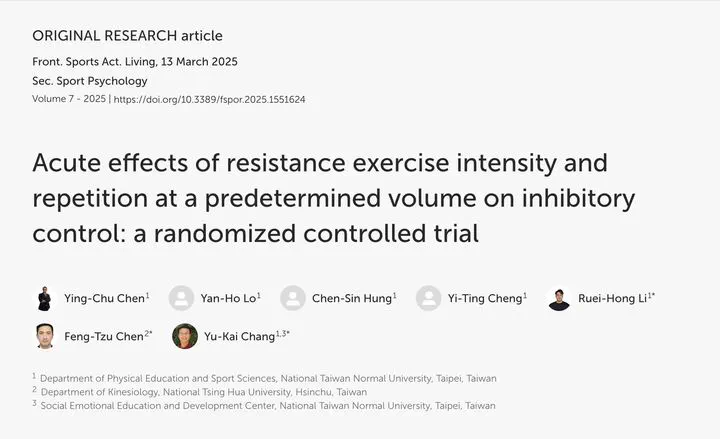Acute effects of resistance exercise intensity and repetition at a predetermined volume on inhibitory control:a randomized controlled trial
Mar 13, 2025·
,
,
,
,
,
,
·
0 min read
Ying-Chu Chen
Yan-Ho Lo
Chen-Sin Hung
Yi-Ting Cheng
Ruei-Hong Li
Feng-Tzu Chen
Yu-Kai Chang
 Image credit: Ying-Chu Chen et al.
Image credit: Ying-Chu Chen et al.
Abstract
Background: This randomized controlled trial examined the acute effects of resistance exercise (RE) intensity and repetition—under volume-controlled conditions—on inhibitory control (IC).
Methods: Seventy-eight young adults were randomly assigned to one of three groups: a moderate-intensity group (MI: 60% 1RM, 3×10 reps), a low-intensity group (LI: 30% 1RM, 3×20 reps), or a control group (CON: reading). Exercise volume was matched between the two RE groups. Inhibitory control was assessed using the Stroop Task. Physiological measures included heart rate, perceived exertion, and blood lactate concentration at various time points.
Results: Both MI (p = .026) and LI (p = .040) groups demonstrated significantly better Stroop performance compared to CON, with no significant difference between MI and LI. Blood lactate levels significantly increased in both RE groups post-intervention, also with no difference between them.
Conclusion: Acute resistance exercise improves inhibitory control and elevates lactate levels when exercise volume is matched, regardless of intensity. These findings suggest that RE intensity can be flexibly adjusted without compromising cognitive benefits.
Keywords: Resistance Exercise; Inhibitory Control; Stroop Task; Exercise Intensity; Cognitive Function
Type
Publication
In Frontiers in Sports and Active Living, Section:Sport Psychology, Volume 7